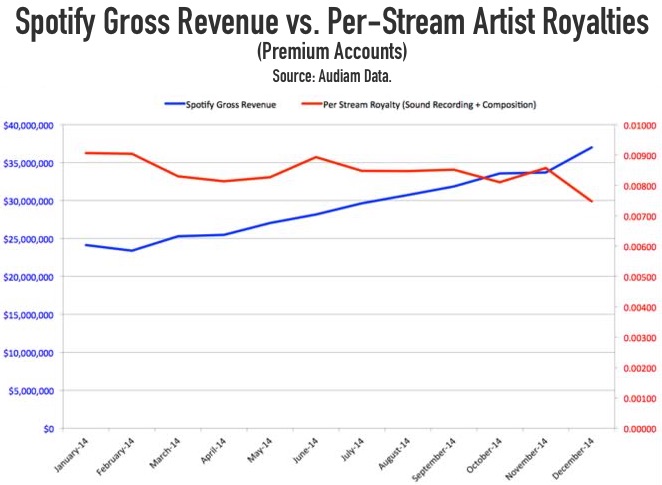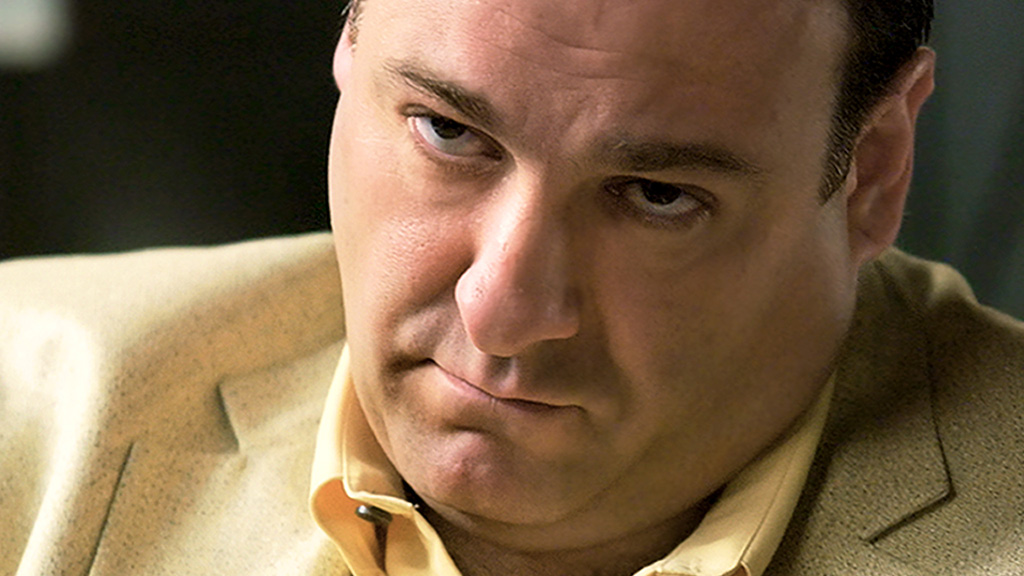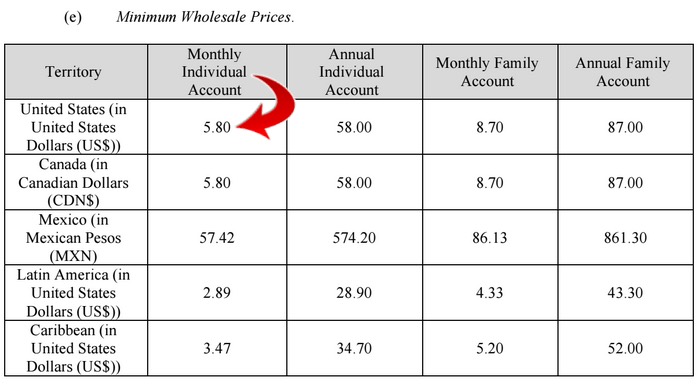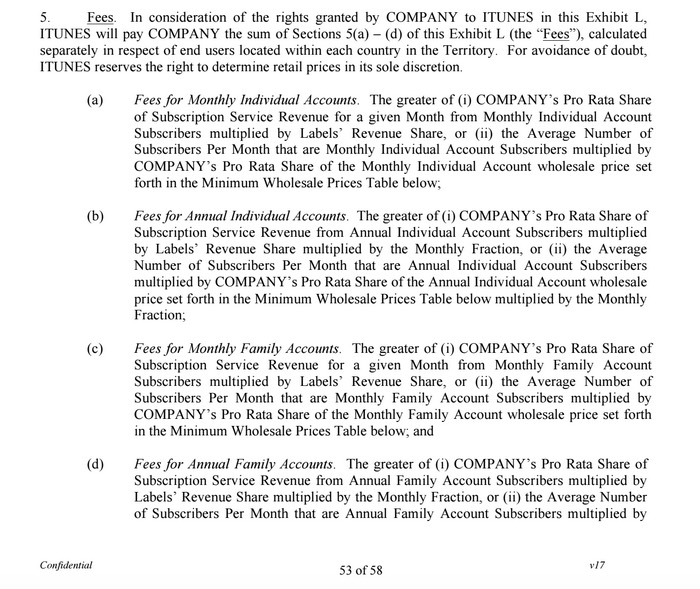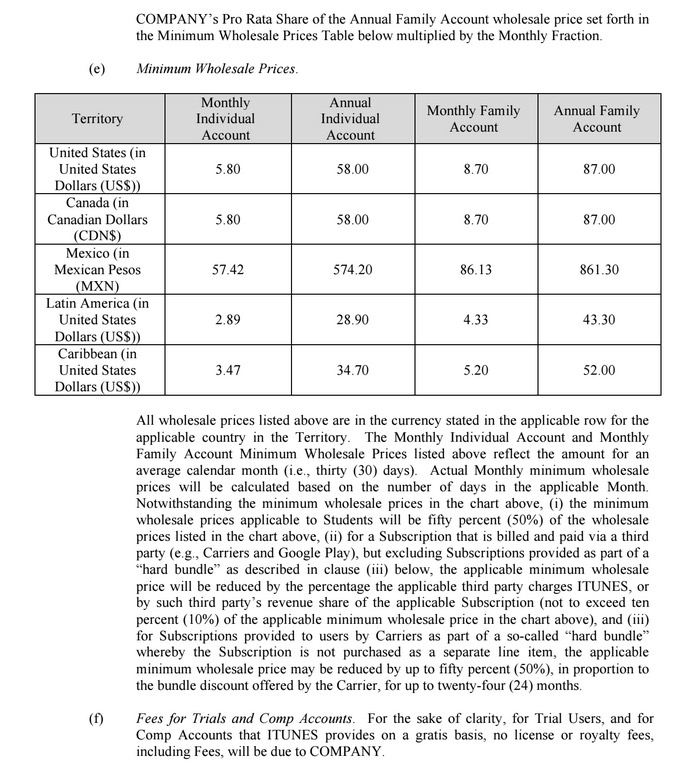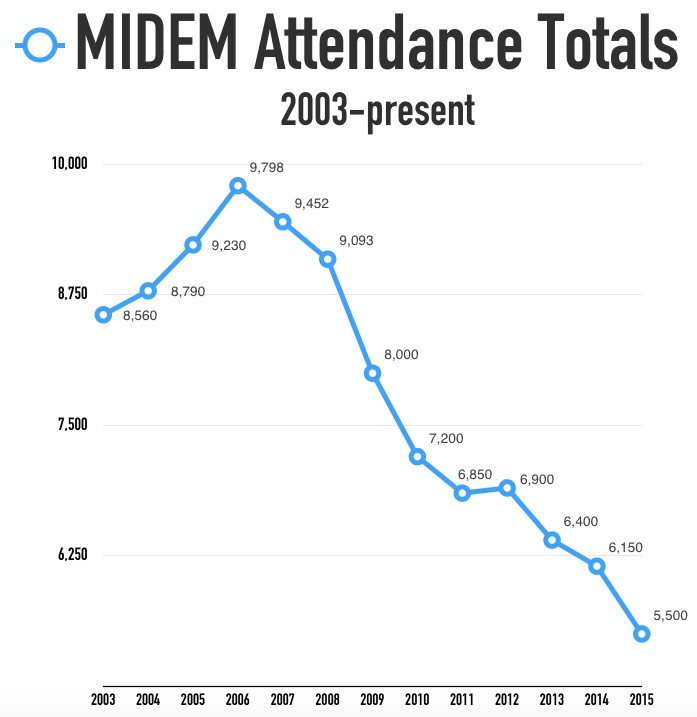The More Money Spotify Makes, The Less Artists Get Paid…
The following guest post comes from Jeff Price, one of the original founders of Tunecore and more recently, founder YouTube music-focused MCN, Audiam. Jeff’s mission is to gets rights holder paid from the digital use of their music.
Spotify just posted a blog stating…
“As we grow, the amount of royalties we pay out to artists, songwriters and rights holders continues to climb faster than ever. We have now paid more than $3 billion USD in royalties, including more than $300 million in the first three months of 2015 alone. That’s good for music, good for music fans… and good for music makers.”
There is good news in their numbers. Unfortunately, that’s only part of the story.
In 2014, as Spotify’s Gross Revenue, subscribers and music royalty pool went up, the amount artists, songwriters, publishers and labels were paid went DOWN.
You can see this trend in the graph I posted at the top of this article. You can also see the decline across all major metrics…
Some Notable Spotify Premium Statistics From January, 2014 to December, 2014.
- In January 2014, an artist receiving 10,000 streams in Spotify Premium and controlling the rights to their recording and composition made $90.64.
- In December 2014, for the same number of streams the artist made $74.72, this is a DECREASE of -17.56%.
- Due to the drop in the royalty rate, for the artist to earn the same amount in December, 2014 as they did 11 months earlier in January, 2014 the artist needed an extra 2,131 streams.
- The amount earned by the songwriter/publisher as a Mechanical Royalty each time a recording of their song was streamed in 2014 went DOWN -5.37% from $0.00071961 in January to $0.000681 in December.
- The amount earned for a sound recording each time it was streamed in 2014 went DOWN -17.39% from $0.0074199 in January to $ 0.0061296 in December.
Why Is this Happening?
The Spotify Premium monthly per-stream rates are calculated by dividing the money in the royalty pot (the Spotify Reported Gross Revenue) by the number of streams in that month. The decrease in the per-stream rate is occurring due to the number of streams per month growing at a more rapid rate than the revenue.
In other words, it appears anyone that pays $10 a month for unlimited music streams a hell of a lot of music. In addition, as the rates drop, the money is being spread over a larger number of artists causing the money to spread more “thinly”.
The end result in 2014 for Spotify’s Premium service is an artist needs increased streams each month, at what appears to be untenable rate, to just stay even with were they were financially the previous month.
It also means that in many cases, they can have more streams than the previous month and make less money.

This model could work if people treated the streaming service like a gym membership. That is, pay for a service and only 10% of them truly use it. If this was the case, the royalty pool would be much higher but not diluted so drastically by streams.
It could also work if there were limits on the number of streams each individual could have each month.
In addition to the lowering per stream and the money being spread wider across more artists, a significant percentage of the money earned by songwriters and music publishers is not being paid to them due to Spotify (and all interactive streaming services) building no infrastructure to make the payments. Instead, they outsourced the job to third parties who cannot fulfill their obligations.
(Based on recovery of past mechancial royalties for its clients, Audiam projects that between 7% to 15% of all earned US streaming mechanicals are either not paid at all, paid in part or are paid to the wrong entity.)
If these trends continue, it will be a forever diminishing return for the music creators and copyright holders to the point where there may no longer be an economic business model that generates any real revenue for the music creators and copyright holders.
A possible alternative business model may be to pay for the specific streams on a more direct basis. That is, if someone pays $10 a month, and only streams songs from the album Broken Boy Soldiers by the band The Ranconteurs, the money from these streams would only be paid for the use of these songs and not impact/dilute the royalties to another rights holder.
Finally, the launch of the Apple streaming service at the end of the June, 2015 could catalyze a quick en-masse shift of consumers from buying music to renting/streaming it. When this shift occurs (and it is a “when,” not an “if”), the impact on the artist, songwriter, label, publisher and the music industry as a whole will be significant.
It’s vital we address these issue now before we are left with more money being generated from the use of music than at any time in civilization with less and less of it going to the artists, songwriters, labels and music publishers.
The end result could be a strip-mined music industry in the wake of Silicon Valley IPOs and trillion dollar market caps.
You can view the vast amount of data and analysis that we’ve collected on Spotify and other streaming services here:
The post The More Money Spotify Makes, The Less Artists Get Paid… appeared first on Digital Music News.
Source: Industry News
